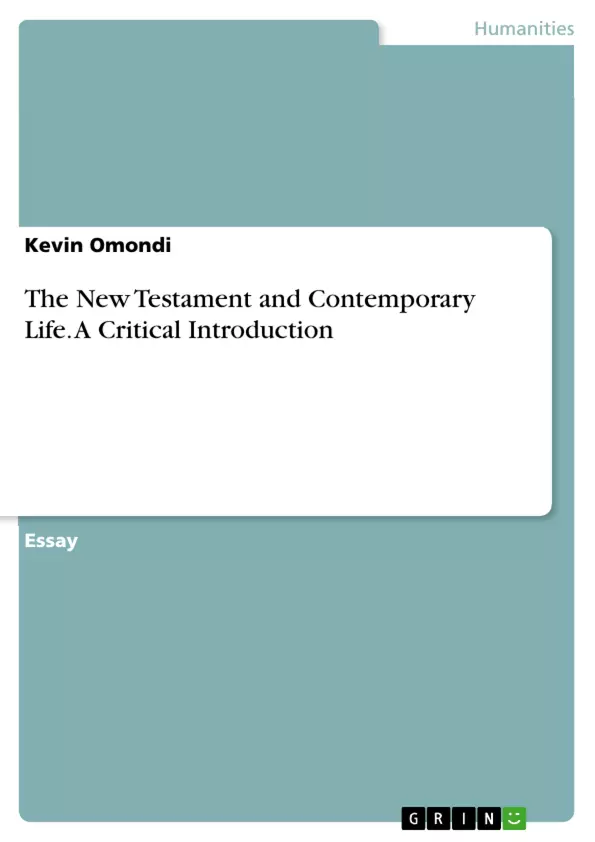This essay depicts the common problem to be facing the modern student of the New Testament, which is the conformity to the standard of the current world.
To address this problem, the author of Roman 12 is pointing us, to the life of transformation as a specific application. The New Testament being a document, which has been in existence universally, contains this call for transformation in the renewed heart. We realized that the conformity and transformation do not exit together; one has to make a decision to transform in order to remain relevant in the renewed heart. To further maintain within the transformed mind, one has to respond to God by a way of confession, repentance and being baptized. This action will humble one to remain within the transformed life in the renewal of their mind.
Inhaltsverzeichnis (Table of Contents)
- The problem facing the modern students of the New Testament...
- The Proposed solution in the New Testament Today.
- Meaning of salvation....
- Means of Salvation
Zielsetzung und Themenschwerpunkte (Objectives and Key Themes)
This text explores the challenges of applying the New Testament teachings to contemporary life, highlighting the need for a transformative understanding of faith in a world shaped by conformity and diverse perspectives. It analyzes the importance of renewing the mind, understanding the meaning of salvation, and recognizing the means through which this salvation is achieved.
- The challenge of conforming to worldly standards versus the transformative call of the New Testament.
- The importance of understanding the renewal of the mind as a key aspect of Christian ethics.
- The concept of salvation as both deliverance and preservation, encompassing spiritual, social, and physical dimensions.
- The means of salvation as a response to God's offer, requiring faith, confession, repentance, and baptism.
- The relationship between individual ethics and the broader Christian community.
Zusammenfassung der Kapitel (Chapter Summaries)
- The problem facing the modern students of the New Testament...: This chapter examines the contemporary challenge of conforming to worldly standards and the need for a transformative renewal of the mind, emphasizing the importance of rejecting conformity and embracing a Christian worldview.
- The Proposed solution in the New Testament Today.: This chapter presents a proposed solution to the challenge of contemporary life, emphasizing the call to present oneself as a living sacrifice to God through a process of transformation, salvation, and commitment. It highlights the connection between these elements and the experience of sanctification or growth in Godliness.
- Meaning of salvation....: This chapter explores the concept of salvation as both deliverance and preservation, encompassing spiritual, social, and physical dimensions. It highlights the liberation from sin, corruption, and limitations, and emphasizes the need for both individual and societal transformation.
- Means of Salvation: This chapter focuses on the human response to God's offer of salvation, highlighting the roles of faith, confession, repentance, and baptism as essential elements in the process of spiritual renewal. It emphasizes the need for personal decision and action, while clarifying that these actions are not a means to earn salvation but a response to God's grace.
Schlüsselwörter (Keywords)
Key themes and concepts explored in this text include the New Testament, contemporary life, renewal of the mind, conformity, salvation, deliverance, preservation, faith, confession, repentance, baptism, Christian ethics, and the Christian community.
Frequently Asked Questions
What is the "renewal of the mind"?
Based on Romans 12, it is the transformative process of rejecting worldly conformity in favor of a Christian worldview.
How does the New Testament define salvation?
Salvation is viewed as both deliverance from sin and preservation, encompassing spiritual, social, and physical dimensions.
What are the means of salvation?
The text identifies faith, confession, repentance, and baptism as the necessary human responses to God's offer of grace.
What challenge do modern students of the New Testament face?
The main challenge is the pressure to conform to the standards and diverse perspectives of the current world.
Is transformation a one-time event?
The essay describes it as a continuous life of transformation and commitment to remain relevant in a renewed heart.
- Citar trabajo
- Kevin Omondi (Autor), 2020, The New Testament and Contemporary Life. A Critical Introduction, Múnich, GRIN Verlag, https://www.grin.com/document/1133021



